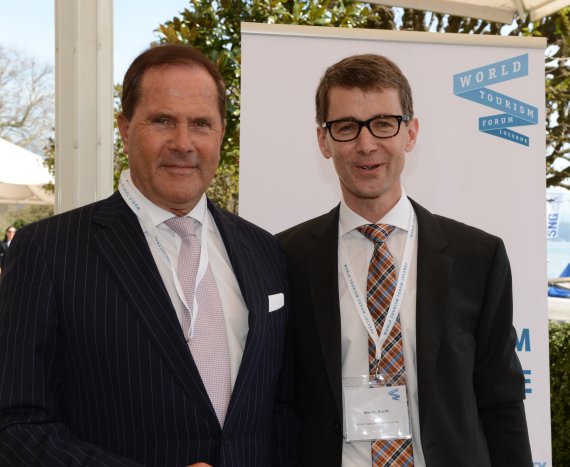WTFL: Demanding talents, hotels put on the brakes - Kempinski with own ideas
 |
|
| Alternation of generations: Kempinski CEO Reto Wittwer (l.) and his colleagues Ufi Ibrahim and Vijav Poonoosamy (next to him) ask the student Marine Billot about her expectations; at the right moderator Anita Mendiratta. |
Lucerne (May 31, 2013). "We would like to give the industry something back," said Kempinksi's CEO Reto Wittwer at the opening of the 3rd World Tourism Forum Luzern (WTFL) in April, which young talents of the industry were explicitly invited to join in Switzerland for the third time and take part in the discussions on stage. However, the demands of generation Y and reality in tourism diverge massively. On an international level, a panel discussion in which an Australian student took part, once again showed the enormous difficulties that occur when communicating with young talents addicted to careers. On the sidelines, Reto Wittwer explained how Kempinski is able to bring selected young talents into the GM career more quickly with a dedicated programme.
"We need to be on the same wavelength as the young people, share the same radar," said Reto Wittwer to hospitalityInside.com at WTFL. This was the reason why he volunteered for the third time as "chairman" of the congress focus: "talents". But a panel discussion including one of these "young talents" revealed how difficult it is to adjust to that wavelength.
James Hyde, partner of the Korn/Ferry London leadership consultancy, had started a survey among 50 leaders showing, among other things, that although the tourism business is growing in general, there are no more leaders on the market. The executive teams have become five years younger on average in the meantime. What will it lead to? The solution seems to be concealed behind one's own attitude, which means trying to understand "generation Y" ... After all, Hyde has not been the first to give such advice at congresses. But real life is not that simple, as the discussion revealed.
 |
|
| Young, selfconscious and demanding: Generation Y. |
"Today's managers
do not understand us"
Unbelieving astonishment spread on the podium as well as among the audience when Marine Billot from Australia, a student at Queensland University, described how she and her friends of generation Y expect their future professional lives to be. Accordingly, she complained that young people do not see any perspective in the tourism sector and they notice mistakes: "Today's managers do not understand us. As long as this is the case, it won't work out," she said, briefly summarising the situation.
Gen Y has enormous self-confidence and modesty is completely unknown to them. This was also pointed out by Charles Donkor, Partner Human Capital Consulting at PricewaterhouseCoopers, when he said that two thirds of Gen Y thought they could become a CEO. Gen Y was loyal towards their jobs, but not towards their company, as they constantly suspected their employers of not standing behind their job offers. Gen Y wants to stay a maximum of four years at one company – and probably only then if they have a mentor and a clear career perspective in view. Accordingly, Donkor predicted that hierarchies will disappear and the older ones will learn or have to learn from the young.
Student Marine Billot went even further to correct these statements: "We want to stay only one year at a company and climb up the career ladder as fast as possible;" she emphasised. They want to be a part of the (deciding) company communication and rise in the ranks both quickly and "vertically".
 |
|
| Giving young talents a space: Reto Wittwer and congress organizer Professor Martin Barth. |
Convincing through "TTT"
At that point, even Reto Witwer put on the brakes. It was certainly not wrong to have ambitions. "But not everybody can become a CEO. There are simply not enough companies in the world," he said, putting the high expectations into perspective. At the same time, he admitted that "TTT" was of great importance towards young talents – Time To Talk. In this way, everybody could find their role in a company.
The student, however, was not satisfied with Wittwer's answer. She wanted to know from CEOs why it was not possible to climb the career ladder faster. Reto Wittwer compared it to a marathon. You will be taken serious only if you have surpassed your physical and intellectual limits – "abilities that will grow". Vijay Poonosamy, Vice President International Affairs of Etihad Airways assisted Kempinski's CEO: It was about fostering one's talent. And if goals were set realistically, nobody would get frustrated.
Ufi Ibrahim, Head of British Hospitality Association, called upon the hotel industry, which consisted of many small companies, to take the chance to demonstrate its diversity to young talents. And what was Marine's conclusion after all this, how does she see the industry in a comparison? "Passion is all that counts," she confessed. And she defines passion as the dream she is able to live when she wakes up.
Similar discussions with the Gen Y had already taken place at this year's "ITB Hospitality Day" (see link); they all show that the dispute with young talents has been one of the greatest challenges for the industry. It hits the service industry right at the centre of its vital nerve. / map
|
KEMPINSKI'S MAJOR EFFORT FOR YOUNG TALENTS The luxury hotel chain Kempinski is expanding, just like most other chains, but not as aggressively. Nevertheless, 45 hotels in the pipeline require specific staff decisions and the systematic hiring of qualified managers. "We have permanent challenges," says CEO Reto Wittwer, describing the struggle for good staff. Today, this has already become part of the daily routine and is no longer a future challenge anymore. |
|
Continuative Links:
- May 3, 2013 The luxury lies in the limitation - Kempinski CEO Reto Wittwer on projects, plans and interchangeable 5-stars
- March 22, 2013 The aim is work-life integration - ITB Hospitality Day Talk: Gen Y scrutinises hotel industry, employers show way
To print this article you have to be registered and logged in for newsletter, visitor or subscription.





